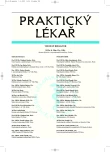-
Medical journals
- Career
Will the “Mexican” (swine) flu cause a pandemic?
Authors: J. Havlík
Authors‘ workplace: Přednostka: doc. MUDr. Vilma Marešová, CSc. ; I. Infekční klinika 2. LF UK ; FN na Bulovce, Praha ; Univerzita Karlova v Praze
Published in: Prakt. Lék. 2009; 89(5): 237-239
Category: Of different specialties
Overview
Almost every year in the winter months an increased number of viral respiratory infections is observed and an epidemic of seasonal flu occurs at the same time. Once in 10, or even up 40 years, flu breaks out at any time of the year, caused by a new virus that has not been in the population for many years. The influenza vaccine used is therefore inefficacious and the disease spreads throughout the world. A few years ago, there was a concern, that A(H5N1) virus responsible for a disastrous panzootic in poultry, might mutate and lead to a pandemic in humans. This did not happen, however anti-pandemic plans were prepared.
In mid-April 2009, severe cases of flu caused by an unknown virus A(H1N1) were reported in several places in Mexico. In a few weeks this infection spread to more than 30 countries all over the world and contact infections in humans appeared. Implementation of an anti-pandemic plan prevented a mass outbreak of this infection. The next few months will show whether this „mexican“ or „swine“ flu will develop into a new pandemic.Key words:
seasonal flu, pandemic, avian flu, mexican (swine) flu, antipandemic plan.
Sources
Literatura u autora
Labels
General practitioner for children and adolescents General practitioner for adults
Article was published inGeneral Practitioner

2009 Issue 5-
All articles in this issue
- Systemic risk factors in prevention of diabetic retinopathy
- Nutrition, cancer and cardiovascular diseases
- Will the “Mexican” (swine) flu cause a pandemic?
- Influence of hormonal contraception on thyroid gland diseases
- Influence of an acute disease in geriatric patients – effect of early nutritional support and physiotherapy
- Occupational diseases of the ulnar nerve reported in the Hradec Králové region
- Health status and health problems in Czech children
- Alcohol damages in workplace environment and their prevention
- Chronic kidney disease – a role of nephrologists and general practitioner
- Family occurrence of type E hepatitis due to primary foodborne infection
- Functional assessment (diagnostics) in rehabilitation
- General Practitioner
- Journal archive
- Current issue
- Online only
- About the journal
Most read in this issue- Influence of hormonal contraception on thyroid gland diseases
- Chronic kidney disease – a role of nephrologists and general practitioner
- Occupational diseases of the ulnar nerve reported in the Hradec Králové region
- Functional assessment (diagnostics) in rehabilitation
Login#ADS_BOTTOM_SCRIPTS#Forgotten passwordEnter the email address that you registered with. We will send you instructions on how to set a new password.
- Career

